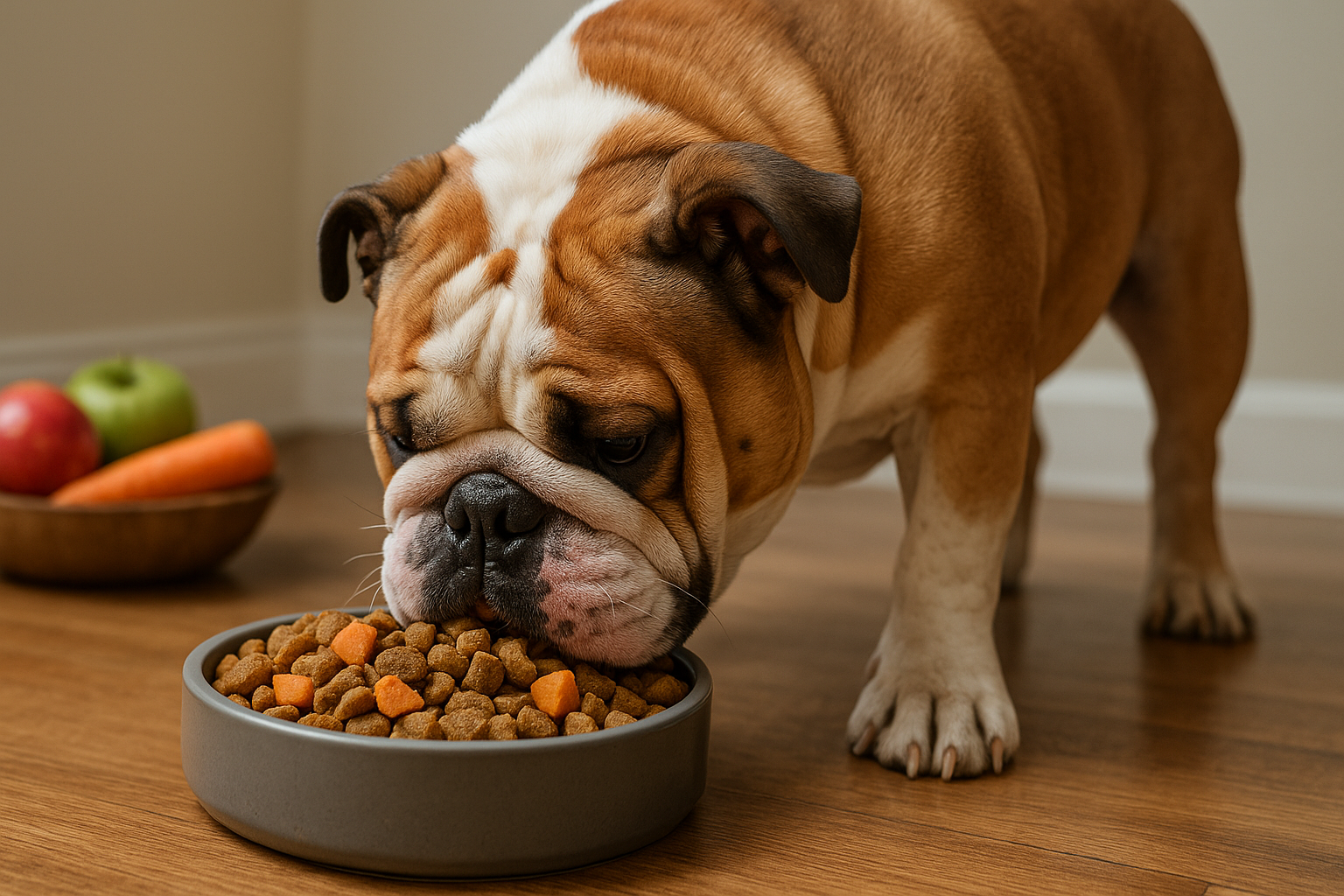A good diet is the foundation for any dog to live a long and healthy life, but in the case of bulldogs, choosing the right food becomes even more important. This breed has several particularities that directly affect how they digest food, their tendency to gain weight, allergies, and even gas issues. So if you already have a bulldog—or you’re thinking about adopting one—it’s essential to know what to feed them and what to avoid to ensure their well-being.
Bulldogs have a stocky body structure and a slower metabolism than other breeds, which makes them prone to gaining weight easily. In addition, many bulldogs have digestive sensitivities or intolerances to common ingredients in commercial dog food. This means their diet needs to be carefully selected, well-balanced, and adapted to their specific needs.
The first step is to choose high-quality food. Not all commercial kibbles are the same, and cheap options can often be more expensive in the long run due to health issues. Ideally, look for dog foods specially formulated for medium-sized breeds with allergies or digestive sensitivity. Always check the ingredients: quality protein should be the first component, preferably from animal sources such as chicken, salmon, lamb, or turkey. Avoid foods with too many by-products, fillers like excessive corn, generic meat meals, or artificial coloring.
Another popular option among some dog owners is natural or homemade food. In this case, it’s absolutely essential to work under the supervision of a veterinarian or canine nutritionist, as it’s very easy to create nutritional imbalances that could affect your bulldog’s health. If you decide to prepare homemade meals, you must include high-quality animal proteins, complex carbohydrates like brown rice or sweet potato, cooked vegetables, and supplements when necessary. Never rely on internet recipes without professional validation.
A growing trend is the BARF diet, which consists of feeding raw, natural foods. While it may offer benefits in terms of digestion and energy levels, it also comes with risks if not handled properly: bacterial contamination, nutritional imbalances, or bone-related issues from inappropriate raw bones. This diet requires professional guidance and very careful handling of the ingredients.
Regardless of which feeding method you choose, there are certain foods that should always be avoided with bulldogs. Among the most dangerous are chocolate, grapes and raisins, avocado, onions and garlic, cooked bones, alcohol, and caffeine. You should also avoid very fatty, salty, or sugary foods, as they can cause digestive issues, pancreatitis, or weight gain. Even some foods that are healthy for humans can be harmful to bulldogs if given in the wrong amounts.
One of the most common concerns among bulldog owners is gas. This breed tends to be gassy due to their sensitive digestive systems and the way they eat. Their short snouts cause them to swallow air while eating, which contributes to flatulence. To reduce this issue, you can try slow-feeder bowls (which force the dog to eat more slowly), split their daily food into two or three meals, and avoid ingredients that promote fermentation, such as excessive grains or certain legumes.
Besides ingredients, portion size is also a critical factor. An overweight bulldog is more likely to develop joint, heart, and breathing problems. It’s important to control portions and avoid overfeeding, even if your dog gives you those “please feed me more” eyes. Treats also count: limit them to no more than 10% of the daily calorie intake and opt for healthy options like apple slices, carrots, or natural additive-free treats.
Water plays a key role in a bulldog’s health as well. They should always have access to clean, fresh water. Some dogs drool a lot after eating, which can quickly contaminate their water. Make sure to change it multiple times a day and clean the bowl regularly to avoid bacteria buildup.
As for supplements, these should only be used under veterinary recommendation. While there are many products on the market that promise to improve coat quality, digestion, or joint health, not all are necessary—or even appropriate—for every dog. A well-fed bulldog on a balanced diet usually doesn’t need extra supplements unless there’s a specific health reason.
It’s also important to remember that every bulldog is unique. Some may have allergies to specific ingredients such as chicken, wheat, or soy. If you notice your dog has constant itching, hair loss, vomiting, diarrhea, or excessive gas, it may be time to change their diet. A veterinarian may suggest allergy testing or an elimination diet to find the root cause of the issue.
When switching your bulldog’s food, always do it gradually. Changing their diet suddenly can lead to digestive upset. Ideally, transition slowly over 7 to 10 days by mixing small amounts of the new food with the old, increasing the new food gradually until it fully replaces the previous one.
In summary, feeding a bulldog properly is about much more than just filling their bowl. It requires understanding their needs, observing their reactions to food, staying consistent with portions, and maintaining a healthy routine. A proper diet doesn’t just help with weight control and disease prevention—it also results in a shinier coat, regular digestion, and a happy, active bulldog full of life. Choosing the right food is one of the best ways to show how much you care.
